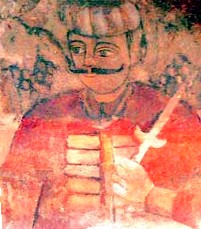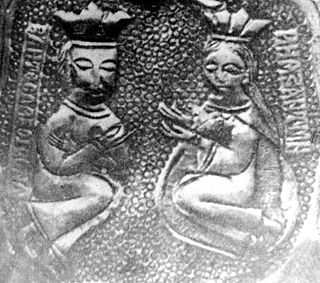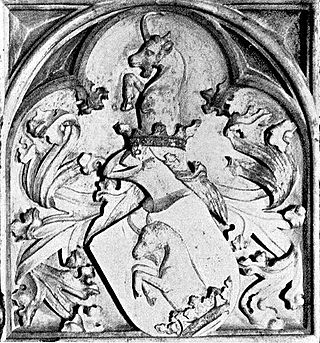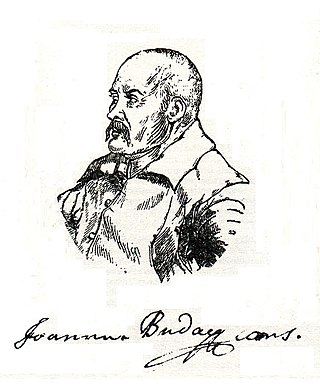
Adrian is a form of the Latin given name Adrianus or Hadrianus. Its ultimate origin is most likely via the former river Adria from the Venetic and Illyrian word adur, meaning "sea" or "water".

Wallachia or Walachia is a historical and geographical region of modern-day Romania. It is situated north of the Lower Danube and south of the Southern Carpathians. Wallachia was traditionally divided into two sections, Muntenia and Oltenia. Dobruja could sometimes be considered a third section due to its proximity and brief rule over it. Wallachia as a whole is sometimes referred to as Muntenia through identification with the larger of the two traditional sections.

Radu III of Wallachia, commonly called Radu the Handsome, Radu the Fair, or Radu the Beautiful, was the younger brother of Vlad the Impaler and prince of the principality of Wallachia. They were both sons of Vlad II Dracul and his wife, Princess Cneajna of Moldavia. In addition to Vlad III, Radu also had two older siblings, Mircea II and Vlad Călugărul, both of whom would also briefly rule Wallachia. In 1462, he defeated his brother, Vlad III, alongside Ottoman Empire sultan Mehmed II, with whom Radu had a close relationship.

Vlad II, also known as Vlad Dracul or Vlad the Dragon, was Voivode of Wallachia from 1436 to 1442, and again from 1443 to 1447. He is internationally known as the father of Vlad the Impaler, or Dracula. Born an illegitimate son of Mircea I of Wallachia, he spent his youth at the court of Sigismund of Luxembourg, who made him a member of the Order of the Dragon in 1431. Sigismund also recognized him as the lawful Voivode of Wallachia, allowing him to settle in nearby Transylvania. Vlad could not assert his claim during the life of his half-brother, Alexander I Aldea, who acknowledged the suzerainty of the Ottoman Sultan, Murad II.

Vladimir is a masculine given name of Slavic origin, widespread throughout all Slavic nations in different forms and spellings. The earliest record of a person with the name is Vladimir of Bulgaria.

Vlad III, commonly known as Vlad the Impaler or Vlad Dracula, was Voivode of Wallachia three times between 1448 and his death in 1476/77. He is often considered one of the most important rulers in Wallachian history and a national hero of Romania.
Mircea is a Romanian masculine given name, a form of the South Slavic name Mirče (Мирче) that derives from the Slavic word mir, meaning 'peace'. It may refer to:
Mircea II (1428–1447) was the Voivode, or prince, of Wallachia in 1442. He was the oldest son of Vlad II Dracul and brother of Vlad Țepeș and Radu the Handsome. He was the grandson of his namesake Mircea cel Bătrân.

Vladislav II was a voivode of the principality of Wallachia, from 1447 to 1448, and again from 1448 to 1456. The way Vladislav II came to the throne is debatable. The most accepted view is that Vladislav assassinated Vlad II Dracul, ruler of Wallachia, and was subsequently placed on the throne by John Hunyadi, on the other, Vladislav II was helped by the Ottomans to replace Dan III which was assigned by the Hungarians.
Basarab IV cel Tânăr, also known as Țepeluș, son of Basarab II, and grandson of Dan II (1422-1431) was 4 times the voivode of the principality of Wallachia between 1474 and 1482: from Oct to Dec 1474, from Jan 1478 to June 1480, from Nov 1480 to before July 1481, and again from Aug 1481 to July 1482.

Vlad IV Călugărul was the Prince of Wallachia in 1481 and then from 1482 to 1495.

Vladislav is a male given name of Slavic origin. Variations include Volodislav, Vlastislav and Vlaslav. In the Czech Republic, Slovakia and Croatia, the common variation is Ladislav.
Sergius is a male given name of Ancient Roman origin after the name of the Latin gens Sergia or Sergii of regal and republican ages. It is a common Christian name, in honour of Saint Sergius, or in Kyivan Rus', of Sergius of the Holy Caves, one of saint Fathers of Kyiv, Saint Sergius of Radonezh, and has been the name of four popes. It has given rise to numerous variants, present today mainly in the Romance and Slavic languages. It is not common in English, although the Anglo-French name Sergeant is possibly related to it.
Justina is an anglicised versions of the Latin name Iustina, feminine of Iustinus, a derivative of Iustus, meaning fair or just. For the masculine version of the name, see Justin.

The military history of Romania deals with conflicts spreading over a period of about 2500 years across the territory of modern Romania, the Balkan Peninsula and Eastern Europe and the role of the Romanian military in conflicts and peacekeeping worldwide.

Justina Szilágyi de Horogszeg was a Hungarian noblewoman, who became the second wife of Vlad Dracula, Voivode of Wallachia. She was the daughter of Ladislaus or Osvát Szilágyi and thus a cousin of Matthias Corvinus, King of Hungary. Corvinus first gave her in marriage to Wenceslas Pongrác of Szentmiklós. Pongrác had inherited estates in Upper Hungary, but was forced to renounce them in exchange for landed property he and Justina jointly received in Transylvania following their marriage. After Pongrác died in 1474, the widowed Justina married Vlad, whom Corvinus acknowledged as the lawful voivode of Wallachia in 1475. Vlad seized Wallachia in late 1476, but soon died in battle. To strengthen her claim to her Transylvanian estates, she married Paul Suki, who was related to the former owners of those territories. After the death of Suki, in 1479, Justina was married to John Erdélyi of Somkerék, until her death in 1497.
Radu is a masculine Romanian given name of Slavic etymological origin, derived from the Old Church Slavonic root rad-. Radu became widespread among the (non-Slavic) Romanians because of Radu Negru's status as legendary founder of Wallachia, a historical Romanian state. Many Wallachian and some Moldavian voivodes or princes have been named Radu.

Dan the Younger was a pretender to the throne of Wallachia from 1456 to 1460. He was the son of Dan II of Wallachia who died fighting for the throne in 1431. After Dan's brother, Vladislav II of Wallachia, was killed by their cousin, Vlad Dracula, in a duel in 1456, Dan settled in Brașov. Besides Dan, Vlad Dracula's half-brother, Vlad the Monk, and Dan's brother, Basarab Laiotă, laid claim to Wallachia against Dracula. Dan tried to seize Wallachia with the support of the burghers of the town, but he was defeated and captured in a battle near Rucăr. He was forced to dig his own grave before being beheaded.

Ion Budai-Deleanu was a Romanian scholar, philologist, historian, poet, and a representative of the Transylvanian School.












